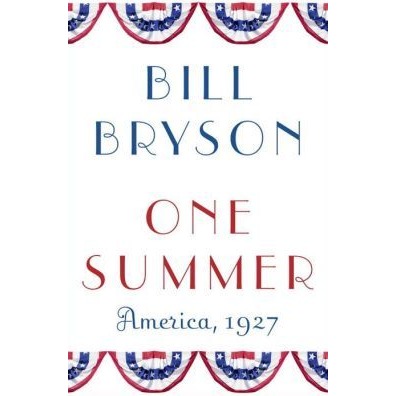 Every once in awhile something pops up on Facebook that intrigues me after having waded through the usual political rants and videos of cats doing algebra (or something like that). A few weeks ago I noticed that book publisher Doubleday was offering a chance for those who blog or otherwise add our verbosity to an already crowded cyberspace to receive an advance reading copy of Bill Bryson’s upcoming book One Summer: America, 1927. Having been a Bryson fan since spitting my coffee across the table while laughing out loud (the real kind of laughter, not the LOL kind) at his memoir of hiking the Appalachian Trail in A Walk in the Woods, I jumped at the chance to enter the Facebook contest to land the book. Last Friday, quite unexpectedly, the book arrived on my doorstep (thank you, Doubleday!).
Every once in awhile something pops up on Facebook that intrigues me after having waded through the usual political rants and videos of cats doing algebra (or something like that). A few weeks ago I noticed that book publisher Doubleday was offering a chance for those who blog or otherwise add our verbosity to an already crowded cyberspace to receive an advance reading copy of Bill Bryson’s upcoming book One Summer: America, 1927. Having been a Bryson fan since spitting my coffee across the table while laughing out loud (the real kind of laughter, not the LOL kind) at his memoir of hiking the Appalachian Trail in A Walk in the Woods, I jumped at the chance to enter the Facebook contest to land the book. Last Friday, quite unexpectedly, the book arrived on my doorstep (thank you, Doubleday!).
One Summer: American, 1927 isn’t a laugh-out-loud sort of Bryson book, but there are moments of wit (“For Warren G. Harding, the summer of 1927 was not a good one, which was perhaps a little surprising since he had been dead for nearly four years by then.”). Instead, Bryson offers us a snapshot of one of the more intriguing summers in American history, where celebrities were truly larger than life (Babe Ruth) and began to learn how to wrestle with worldwide fame (Charles Lindbergh). It was the summer when Al Capone ruled Chicago, but probably never beat anyone with a baseball bat (a la The Untouchables). Talking pictures were the hot new thing at the movies, while the lights of Broadway began to fade while New York was captivated by the ’27 Yankees; arguably the best team in baseball history. It was a season of salacious tabloid murder cases, an epic Mississippi flood, and the rise of the capable but irritatingly vain Herbert Hoover. Prohibition was in force, but not the practical law of the land for the public whom the U.S. government essentially tried to poison in an attempt to keep the nation dry.
Bryson’s account of the major stories in the era of The Great Gatsby is a great read and reveals the way that history should be written–as a fascinating story that is really about who we are as an American people. We find ourselves in these pages as we look into the generation just before the Greatest Generation. there are lots of snapshots here of aspects of 21st century life that found their genesis in the early 20th century: tabloid journalism, celebrity worship, the movie house, the home run, and car culture, just to name a few (Bryson’s descriptions of Henry Ford’s whackadoodle ways are worth the price of the book alone).
I enthusiastically recommend this book for armchair historians and students of pop culture alike. This is a social history of a time between American wars, which usually doesn’t get the kind of prominence on the bookstore shelf as military history. It’s history that is a joy to read and well-researched, or at least I believe it is: the advance copy of the book was so advanced that it hadn’t even been fully edited yet, with blank pages where the endnotes and bibliography go (always a key part of the book for us historian types). There were also no photos from that era in the middle of the book, which I hope will be in the final edition.
In short, there’s no better way for you to enjoy the end of the summer of 2013 than diving into One Summer: America, 1927.

